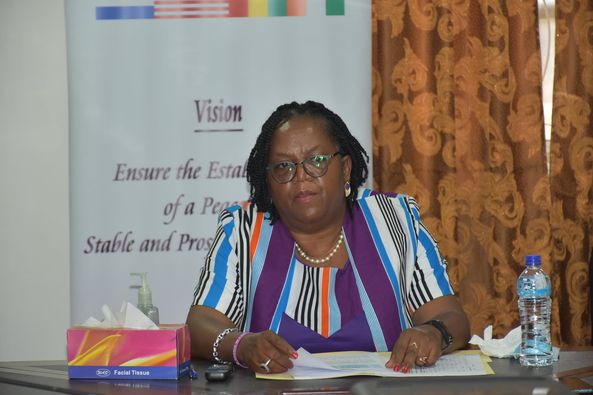Ambassador Medina Wesseh, former Secretary General of the Mano River Union, addressed students at Ricks Institute in Brewerville, Liberia, emphasizing the crucial importance of thoughtful career selection. She urged students to prioritize personal passion and genuine interest over financial gain when choosing their professional paths. Wesseh stressed the significance of aligning one’s chosen career with their inherent inclinations, emphasizing that true fulfillment and success stem from pursuing a vocation that resonates with one’s individual talents and passions. She cautioned against being swayed by perceived financial rewards, arguing that a career driven solely by monetary considerations is unlikely to yield long-term satisfaction or professional growth.
Wesseh, a multifaceted professional with expertise in communication, diplomacy, law, and politics, highlighted the necessity of viewing a career as a long-term commitment, a life decision that shapes an individual’s trajectory. She encouraged students to approach career selection with a sense of purpose, recognizing that it’s a deliberate choice, not a confining cage. While acknowledging the influence of family background and societal expectations on career choices, she emphasized the importance of personal agency and the freedom to adapt and evolve one’s professional path over time. Her central message was that a career should be a source of genuine enjoyment and intellectual stimulation, not merely a means to an end.
The Ambassador challenged the prevalent trend among Liberian university graduates who often gravitate towards fields like Accounting, Sociology, and Administration, leading to heightened competition and limited job prospects. She advocated for exploring less conventional but equally vital areas such as Agriculture, Pharmacology, and Aquatic Engineering, where demand often outstrips supply. Wesseh pointed out a paradoxical relationship between ease of study and job availability: fields that are easier to study often lead to more competitive job markets, while more challenging fields, particularly in science and technology, offer greater opportunities for employment. This observation underscored her call for students to embrace challenging academic pursuits that align with their genuine interests and contribute to societal needs.
Wesseh’s address served as the keynote speech for Ricks Institute’s career day, a novel initiative designed to guide students towards informed career decisions. The school administration acknowledged the widespread absence of career guidance and counseling within Liberian educational institutions, highlighting the crucial need for such support to empower students in navigating their professional futures. The career day program aimed to equip students with a clear understanding of career options and encourage self-discovery in aligning their passions and skills with potential career paths.
Kpaka Kemah, Vice Principal for Administration at Ricks Institute, expressed profound gratitude for Ambassador Wesseh’s insightful and timely message, recognizing its potential to resonate deeply with the students. He emphasized the significance of her contribution, particularly in a context where career guidance is often lacking in Liberian schools. Kemah stressed the importance of the career day program in addressing this gap and providing students with the necessary tools and insights to make informed career choices. He echoed Wesseh’s concerns about the lack of guidance counselors in Liberian schools, highlighting the challenges faced by graduating students in navigating career decisions without adequate support.
The career day program at Ricks Institute, featuring Ambassador Wesseh’s address, represents a significant step towards addressing a critical gap in the Liberian education system. By providing students with exposure to diverse career paths and encouraging them to prioritize passion and purpose over solely financial considerations, the program seeks to empower them to make informed decisions that will shape their future. This initiative underscores the importance of integrating career guidance and counseling into the educational framework to equip students with the necessary tools to navigate the complexities of the professional world and contribute meaningfully to society.














